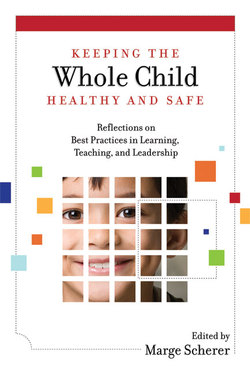Читать книгу Keeping the Whole Child Healthy and Safe - Marge Scherer - Страница 8
На сайте Литреса книга снята с продажи.
Democracy and Schools
ОглавлениеA productive discussion of education's aims must acknowledge that schools are established to serve both individuals and the larger society. What does the society expect of its schools?
From the current policy debates about public education, one would think that U.S. society simply needs competent workers who will keep the nation competitive in the world market. But both history and common sense tell us that a democratic society expects much more: It wants graduates who exhibit sound character, have a social conscience, think critically, are willing to make commitments, and are aware of global problems (Soder, Goodlad, & McMannon, 2001).
In addition, a democratic society needs an education system that helps to sustain its democracy by developing thoughtful citizens who can make wise civic choices. By its very nature, as Dewey (1916) pointed out, a democratic society is continually changing—sometimes for the better, sometimes for the worse—and it requires citizens who are willing to participate and competent enough to distinguish between the better and the worse.
If we base policy debate about education on a serious consideration of society's needs, we will ask thoughtful questions: What modes of discipline will best contribute to the development of sound character? What kinds of peer interactions might help students develop a social conscience? What topics and issues will foster critical thinking? What projects and extracurricular activities might call forth social and personal commitment? Should we assign the task of developing global awareness to social studies courses, or should we spread the responsibility throughout the entire curriculum (Noddings, 2005b)?
In planning education programs for a democratic society, we must use our understanding of the aims of education to explore these questions and many more. Unfortunately, public policy in the United States today concentrates on just one of the Cardinal Principles proposed by NEA in 1918: "command of the fundamental processes." Although reading and math are important, we need to promote competence in these subjects while also promoting our other aims. Students can develop reading, writing, speaking, and mathematical skills as they plan and stage dramatic performances, design classroom murals, compose a school paper, and participate in establishing classroom rules.
If present reports about the effects of NCLB on the education of inner-city and minority children are supported by further evidence, we should be especially concerned about our democratic future. Wealthier students are enjoying a rich and varied curriculum and many opportunities to engage in the arts, whereas many of our less wealthy students spend their school days bent over worksheets in an effort to boost standardized test scores (Meier & Wood, 2004). Such reports call into question the notion that NCLB will improve schooling for our poorest students. Surely all students deserve rich educational experiences— experiences that will enable them to become active citizens in a democratic society.
Life in a healthy democracy requires participation, and students must begin to practice participation in our schools. Working together in small groups can furnish such practice, provided that the emphasis is consistently on working together—not on formal group processes or the final grade for a product. Similarly, students can participate in establishing the rules that will govern classroom conduct. It is not sufficient, and it may actually undermine our democracy, to concentrate on producing people who do well on standardized tests and who define success as getting a well-paid job. Democracy means more than voting and maintaining economic productivity, and life means more than making money and beating others to material goods.
